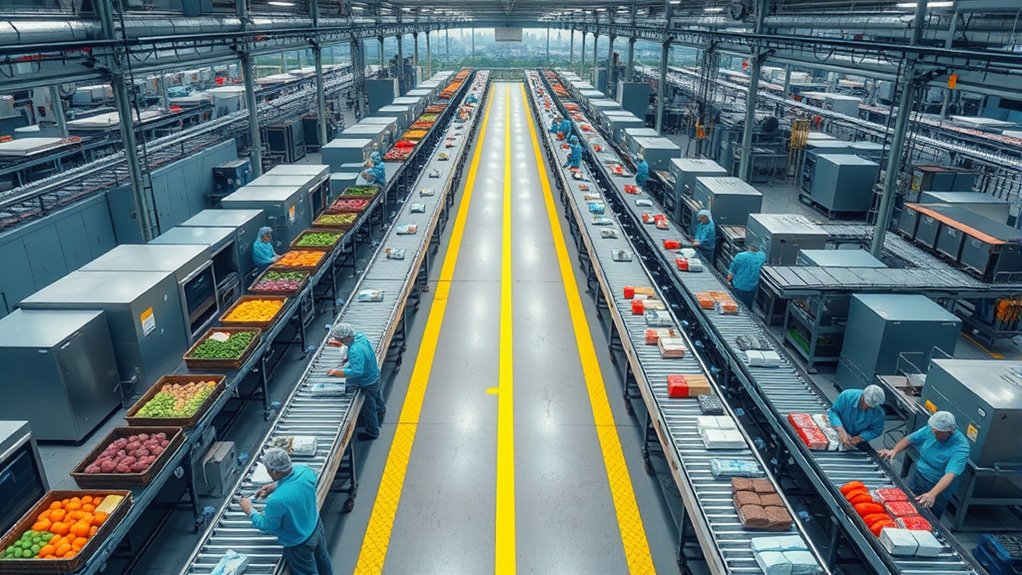Food safety regulations across state lines set the standards you must follow to keep food safe, properly labeled, and uncontaminated as it moves through different parts of the country. These laws are established by federal agencies like the FDA and USDA but can also include stricter state rules. Staying compliant helps you avoid penalties and protect public health. If you keep exploring, you’ll gain a clearer understanding of how these regulations work together to ensure nationwide food safety.
Key Takeaways
- Federal agencies like FDA and USDA set baseline food safety standards applied across all states.
- States may implement additional or stricter regulations for food labeling, packaging, and transportation.
- Interstate food laws ensure consistency in safety practices, labeling, and handling across state borders.
- Businesses must comply with both federal and state-specific regulations to avoid penalties.
- Regular monitoring, inspections, and reporting are essential to maintain food safety across state lines.

Have you ever wondered how the food you eat stays safe from contamination and spoilage? It’s a good question, especially since food often travels across state lines before reaching your plate. Ensuring food safety across different jurisdictions involves understanding cross border compliance and interstate food laws, which are designed to keep the food supply secure and consistent nationwide. These regulations set the standards that producers, distributors, and retailers must follow to prevent foodborne illnesses and maintain quality. When food crosses state borders, it’s not just about compliance with local rules; it’s about adhering to a complex network of laws that work together to safeguard public health.
Cross border compliance is critical because it guarantees that food products meet the safety requirements of each state they enter. This involves following federal regulations, primarily overseen by agencies like the Food and Drug Administration (FDA) and the United States Department of Agriculture (USDA), which establish baseline standards. However, states can have additional rules or stricter standards, making understanding and steering through interstate food laws essential for businesses operating in multiple states. You, as a consumer or producer, rely on these laws to guarantee that the food you buy or sell has been inspected, handled properly, and stored under safe conditions.
Interstate food laws also address labeling, packaging, and transportation practices. They specify how food should be packaged to prevent contamination during transit and how it must be labeled to inform consumers about ingredients, allergens, and expiration dates. These laws help maintain consistency, so no matter which state your food comes from, it adheres to the same safety standards. This uniformity simplifies compliance for businesses and reassures consumers that the food they purchase across state lines is safe. For example, if you’re a restaurant chain sourcing ingredients from multiple states, understanding interstate laws guarantees you’re always in compliance, avoiding costly penalties and potential health risks.
Moreover, federal agencies monitor and enforce these standards through inspections, recalls, and reporting systems. They coordinate with state agencies to ensure that food producers and distributors follow the appropriate protocols. As someone involved in the food industry, staying updated on these regulations is vital to prevent legal issues and protect your reputation. Being aware of cross border compliance means you’re proactive about maintaining safety standards, minimizing risks, and building trust with your customers. Overall, the intricate web of interstate food laws works behind the scenes to keep your food safe, regardless of where it’s produced or consumed.
Frequently Asked Questions
How Do Interstate Food Safety Regulations Impact Small Food Businesses?
Interstate food safety regulations require you to meet cross state compliance, which can be complex for small food businesses. You’ll need to understand different rules for business licensing and safety standards in each state you operate in. This may involve additional paperwork, inspections, and costs, making it harder to expand or operate smoothly across state lines. Staying informed and prepared helps you avoid penalties and guarantees your products meet all safety requirements.
Are There Federal Standards That Supersede State Regulations?
Federal oversight firmly follows, superseding state standards to guarantee consistent compliance nationwide. You’ll find that federal food safety standards set the strict, standardized foundation, especially for interstate commerce. These regulations streamline safety, simplify compliance, and safeguard public health across state lines. As a result, you can rely on federal guidelines to help your small business meet minimum safety measures, making it easier to operate smoothly across diverse state boundaries and avoid regulatory conflicts.
How Often Do States Update Their Food Safety Laws?
States typically update their food safety laws every few years, often prompted by new food safety audits and regulatory updates. You should stay informed by checking with state agencies, as updates can happen more frequently following outbreaks or federal guideline changes. Regular reviews guarantee laws keep pace with industry practices and scientific advancements, helping you maintain compliance and protect public health effectively.
What Challenges Exist in Enforcing Food Safety Across State Borders?
You might think enforcing food safety across state borders is straightforward, but irony hits hard here. Interstate compliance and cross-border inspections often stumble over inconsistent regulations, making enforcement tricky. States may hesitate to share data or conduct joint inspections, creating gaps in safety. This patchwork approach hampers swift action, risking contamination. So, while the goal is seamless safety, the reality is a tangled web of differing laws and inspection standards.
How Can Consumers Verify Food Safety Compliance in Different States?
You can verify food safety compliance in different states by checking for valid food safety certifications and reviewing inspection reports from local health departments. Look for certifications like ServSafe or HACCP, and ask vendors for recent inspection reports to guarantee they meet safety standards. Staying informed helps you make safer choices and supports businesses committed to maintaining high food safety practices.
Conclusion
Guiding food safety regulations across state lines can feel like walking a tightrope, but with careful attention, you can keep your operations balanced and secure. Embracing these guidelines helps you serve your community with confidence and care, ensuring everyone enjoys your offerings without concern. By respecting the nuances of each state’s rules, you’re gently steering your business toward smoother sailing, fostering trust and safety along the way. After all, a little extra effort now keeps problems at bay later.









